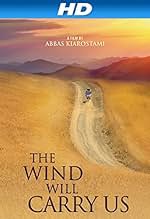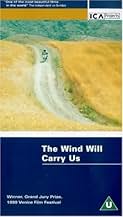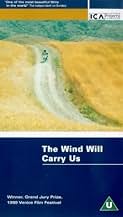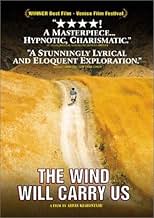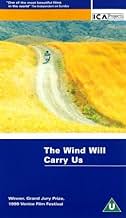IMDb रेटिंग
7.4/10
13 हज़ार
आपकी रेटिंग
अपनी भाषा में प्लॉट जोड़ेंIrreverent city engineer Behzad comes to a rural village in Iran to keep vigil for a dying relative. In the meanwhile the film follows his efforts to fit in with the local community and how ... सभी पढ़ेंIrreverent city engineer Behzad comes to a rural village in Iran to keep vigil for a dying relative. In the meanwhile the film follows his efforts to fit in with the local community and how he changes his own attitudes as a result.Irreverent city engineer Behzad comes to a rural village in Iran to keep vigil for a dying relative. In the meanwhile the film follows his efforts to fit in with the local community and how he changes his own attitudes as a result.
- निर्देशक
- लेखक
- स्टार
- पुरस्कार
- 4 जीत और कुल 7 नामांकन
फ़ीचर्ड समीक्षाएं
This is a beautiful film that celebrates life and culture. It is entirely devoted to the Forough Farrokhzad poem (cited below / I've marked it for stanza; but not for line changes), which serves as it nucleus and core.
[Stanza 1] In my small night, alas, The wind has an appointment with the trees, In my small night there is fear of devastation.
[Stanza 2] Listen. Do you hear the dark wind whispering? I look upon this bliss with alien eyes I am addicted to my sorrow Listen. Do you hear the dark wind whispering?
[Stanza 3] Now something is happening in the night The moon is red and agitated And the roof may cave in at any moment.
[Stanza 4] The clouds have gathered like a bunch of mourners And seem to be waiting for the moment of rain.
[Stanza 5] A moment And after it, nothing. Beyond this window the night trembles And the earth Will no longer turn. Beyond this window an enigma worries for you and for me.
[Stanza 6] Oh you who are so verdant Place your hands like a burning memory in my hands. And leave your lips that are warm with life To the loving caresses of my lips. The wind will carry us away, The wind will carry us away.
Enjoy it with an open and rested mind. The style is minimalist for action and words, and panoramic for scenery. It's an artful exploration of life where the viewer has to glue the pieces together, from city group's arrival and to their take-away from the experience. Details count. Don't miss any of them.
[Stanza 1] In my small night, alas, The wind has an appointment with the trees, In my small night there is fear of devastation.
[Stanza 2] Listen. Do you hear the dark wind whispering? I look upon this bliss with alien eyes I am addicted to my sorrow Listen. Do you hear the dark wind whispering?
[Stanza 3] Now something is happening in the night The moon is red and agitated And the roof may cave in at any moment.
[Stanza 4] The clouds have gathered like a bunch of mourners And seem to be waiting for the moment of rain.
[Stanza 5] A moment And after it, nothing. Beyond this window the night trembles And the earth Will no longer turn. Beyond this window an enigma worries for you and for me.
[Stanza 6] Oh you who are so verdant Place your hands like a burning memory in my hands. And leave your lips that are warm with life To the loving caresses of my lips. The wind will carry us away, The wind will carry us away.
Enjoy it with an open and rested mind. The style is minimalist for action and words, and panoramic for scenery. It's an artful exploration of life where the viewer has to glue the pieces together, from city group's arrival and to their take-away from the experience. Details count. Don't miss any of them.
What a wonderful movie. Iranian movies are making way internationally and are also becoming an important political tool. The leading Iranian director is Abbas Kiarostami. I really enjoyed the rhythm of this strange and different movie. This is an art-film at its very best. All set in the wonderful scenery of Kurdistan. The pictures and the poetry is beautiful. The cast is natural, common people. Please buy the DVD and see it! The movie is - unfortunately - sure not to come to a theater near you. The director Abbas Kiarostami says that 50% of a movie is made by associations and in the audience own head. Very different from the American movies where everything usually is served on one plate.
An engineer (Behzad Dourani) travels to a remote Iranian village on an inexplicable assignment that involves his unseen assistants digging holes. The men work near a hill that turns out to be one of the main settings, and even characters, in Cannes Palme d'Or winner Abbas Kiarostami's new movie, "The Wind Will Carry Us."
Throughout the picture, the perpetually befuddled engineer drives up to the breezy incline to receive cell phone calls that don't come through clearly in the village below. Do the calls concern an old woman who's dying? A search for buried treasure? The exhumation of dead bodies? We never hear the other end of the conversations, so we never find out.
The modern hero's jeep and cell-phone dominated life seems empty of purpose, other than the impulses and sensory input of the moment. The lives of the traditional villagers don't seem any more meaningful. Kiarostami's picture is no ethnographic celebration of simple-hearted, but wise peasants with a profound culture.
The movie is like Samuel Becket's definitive theatre of the absurd, "Waiting for Godot." But while the depressed Irish playwright's characters wander around in a desolate landscape, Kiarostami's engineer is placed in a spacious, richly colored world that yields tantalizing, paradoxical hints of meaning, despite the random, aimless movements of the human beings who inhabit it.
Perhaps we're seeing this story from the wind's point-of-view.
Throughout the picture, the perpetually befuddled engineer drives up to the breezy incline to receive cell phone calls that don't come through clearly in the village below. Do the calls concern an old woman who's dying? A search for buried treasure? The exhumation of dead bodies? We never hear the other end of the conversations, so we never find out.
The modern hero's jeep and cell-phone dominated life seems empty of purpose, other than the impulses and sensory input of the moment. The lives of the traditional villagers don't seem any more meaningful. Kiarostami's picture is no ethnographic celebration of simple-hearted, but wise peasants with a profound culture.
The movie is like Samuel Becket's definitive theatre of the absurd, "Waiting for Godot." But while the depressed Irish playwright's characters wander around in a desolate landscape, Kiarostami's engineer is placed in a spacious, richly colored world that yields tantalizing, paradoxical hints of meaning, despite the random, aimless movements of the human beings who inhabit it.
Perhaps we're seeing this story from the wind's point-of-view.
Another user who reviewed the film speaks of a film so full of 'symbolism' that he couldn't grasp. Maybe because it wasn't there? I'm generally not a fan of minimalism but Kiarostami grips me like no one else. I went out to take the trash after watching this and everything around me felt more alive, the nightsky, moon, trees blowing in the wind, I experienced all this in expansive vivid detail like new life was breathed into them. This is what a Kiarostami film does to me. It's about the sights and sounds of a life simple and profound in that simplicity, profound in the stoic sense of an old man sitting down in the same place every day to sip his tea. The wisdom here is not one of tremendous insight into something we didn't know, but a remembrance of something we knew and have forgotten and need to listen as the wind carries it back. Maybe the next world is beautiful muses a country doctor to our protagonist as they cross golden fields of wheat blowing in the wind, but no one has come back to tell us, so the present world is all we have; and how beautiful it is.
Beautiful Persian Zen.
The film is about waiting for something to happen, waiting for the death of an old woman which an engineer from Tehran and two of his associates have come to document; waiting for a narrative. Every now and then the engineer's cell phone rings, he has poor signal so he must rush to his car and drive to a nearby hill to get good signal. On top of the rocky hill there's a man digging a ditch, sight unseen, and the engineer idly chats with him down in his hole. That man digs up a thigh bone that once belonged to someone, the cemetery of the nearby village is on that hill, and throws it up to our curious protagonist. He stores it away in his car, a symbol of life come and gone. In the end he throws it down a creek and we see the old fickle bone flow down the water. All the symbolism in the film speaks for itself. Trees lush green and fields yellow golden with wheat and a hot dusty wind blowing over this.
I have great admiration for the way Kiarostami makes films. He's so open to the filmmaking process, no strings attached, script, rehearsal, staging, all the mechanics subordinate to the real deal. It takes balls to go into this with as little safeguards. A lot of the film seems to have been improvised on the spot, in that small Iranian village, the faces are real, their casual chitchat the casual chitchat of real people. Take him or leave him, not a lot of people can make films the way he does and make them good.
Beautiful Persian Zen.
The film is about waiting for something to happen, waiting for the death of an old woman which an engineer from Tehran and two of his associates have come to document; waiting for a narrative. Every now and then the engineer's cell phone rings, he has poor signal so he must rush to his car and drive to a nearby hill to get good signal. On top of the rocky hill there's a man digging a ditch, sight unseen, and the engineer idly chats with him down in his hole. That man digs up a thigh bone that once belonged to someone, the cemetery of the nearby village is on that hill, and throws it up to our curious protagonist. He stores it away in his car, a symbol of life come and gone. In the end he throws it down a creek and we see the old fickle bone flow down the water. All the symbolism in the film speaks for itself. Trees lush green and fields yellow golden with wheat and a hot dusty wind blowing over this.
I have great admiration for the way Kiarostami makes films. He's so open to the filmmaking process, no strings attached, script, rehearsal, staging, all the mechanics subordinate to the real deal. It takes balls to go into this with as little safeguards. A lot of the film seems to have been improvised on the spot, in that small Iranian village, the faces are real, their casual chitchat the casual chitchat of real people. Take him or leave him, not a lot of people can make films the way he does and make them good.
An amazing Abbas Kiarostami movie. Inspired by the poem of Furug Ferruhzad, in this film, the director tells the universality experienced in daily life in the Iranian countryside without getting involved in the slightest arabesque element.
When the epic simplicity of the movie is watched with admiration, you will feel sorry for the millions of dollars spent on Hollywood movies of the new era.
When the epic simplicity of the movie is watched with admiration, you will feel sorry for the millions of dollars spent on Hollywood movies of the new era.
क्या आपको पता है
- ट्रिवियाThe title is a reference to a poem written by famous modern Iranian female poet Forough Farrokhzad.
- गूफ़When the engineer is driving back from the mountain, he stops and picks up someone who is walking down the road and starts talking to him, but when the camera shows the car from long shot for the first time, there is no one in the car other than the engineer.
- कनेक्शनFeatured in Siskel & Ebert & the Movies: Double Jeopardy/Jakob the Liar/Mumford (1999)
टॉप पसंद
रेटिंग देने के लिए साइन-इन करें और वैयक्तिकृत सुझावों के लिए वॉचलिस्ट करें
- How long is The Wind Will Carry Us?Alexa द्वारा संचालित
विवरण
- रिलीज़ की तारीख़
- कंट्री ऑफ़ ओरिजिन
- आधिकारिक साइट
- भाषाएं
- इस रूप में भी जाना जाता है
- El viento nos llevará
- फ़िल्माने की जगहें
- उत्पादन कंपनी
- IMDbPro पर और कंपनी क्रेडिट देखें
बॉक्स ऑफ़िस
- US और कनाडा में सकल
- $2,59,510
- US और कनाडा में पहले सप्ताह में कुल कमाई
- $21,417
- 30 जुल॰ 2000
- दुनिया भर में सकल
- $2,59,510
इस पेज में योगदान दें
किसी बदलाव का सुझाव दें या अनुपलब्ध कॉन्टेंट जोड़ें

